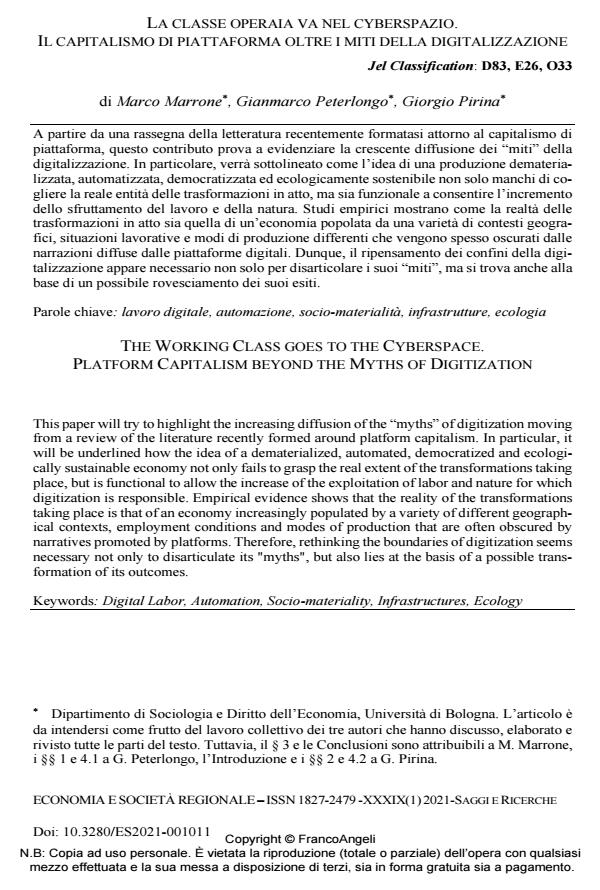La classe operaia va nel cyberspazio. Il capitalismo di piattaforma oltre i miti della digitalizzazione
Titolo Rivista ECONOMIA E SOCIETÀ REGIONALE
Autori/Curatori Marco Marrone, Gianmarco Peterlongo, Giorgio Pirina
Anno di pubblicazione 2021 Fascicolo 2021/1
Lingua Italiano Numero pagine 25 P. 127-151 Dimensione file 372 KB
DOI 10.3280/ES2021-001011
Il DOI è il codice a barre della proprietà intellettuale: per saperne di più
clicca qui
Qui sotto puoi vedere in anteprima la prima pagina di questo articolo.
Se questo articolo ti interessa, lo puoi acquistare (e scaricare in formato pdf) seguendo le facili indicazioni per acquistare il download credit. Acquista Download Credits per scaricare questo Articolo in formato PDF

FrancoAngeli è membro della Publishers International Linking Association, Inc (PILA), associazione indipendente e non profit per facilitare (attraverso i servizi tecnologici implementati da CrossRef.org) l’accesso degli studiosi ai contenuti digitali nelle pubblicazioni professionali e scientifiche.
A partire da una rassegna della letteratura recentemente formatasi attorno al capitalismo di piattaforma, questo contributo prova a evidenziare la crescente diffusione dei "miti" della di-gitalizzazione. In particolare, verrà sottolineato come l’idea di una produzione dematerializzata, automatizzata, democratizzata ed ecologicamente sostenibile non solo manchi di cogliere la reale entità delle trasformazioni in atto, ma sia funzionale a consentire l’incremento dello sfruttamento del lavoro e della natura. Studi empirici mostrano come la realtà delle trasforma-zioni in atto sia quella di un’economia popolata da una varietà di contesti geografici, situazio-ni lavorative e modi di produzione differenti che vengono spesso oscurati dalle narrazioni diffuse dalle piattaforme digitali. Dunque, il ripensamento dei confini della digitalizzazione appare necessario non solo per disarticolare i suoi "miti", ma si trova anche alla base di un possibile rovesciamento dei suoi esiti.
Parole chiave:Lavoro digitale, automazione, socio-materialità, infrastrutture, ecologia
Jel codes:D83, E26, O33
- Smart work e gli stili di vita Davide Dazzi, in QUADERNI DI ECONOMIA DEL LAVORO 113/2022 pp.29
DOI: 10.3280/QUA2021-113003
Marco Marrone, Gianmarco Peterlongo, Giorgio Pirina, La classe operaia va nel cyberspazio. Il capitalismo di piattaforma oltre i miti della digitalizzazione in "ECONOMIA E SOCIETÀ REGIONALE " 1/2021, pp 127-151, DOI: 10.3280/ES2021-001011